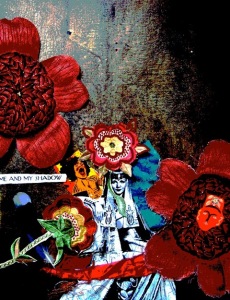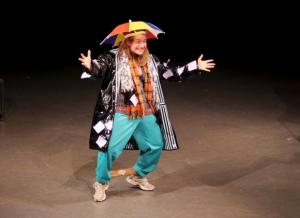Words and Paintings by Robin Sierra
Florence Foster Jenkins sang wildly out of tune, but it did not stop her from becoming an opera diva. Nor did it prevent people from flocking to her turn-of-the-century performances, including private recitals at the Ritz Carlton Hotel in New York City for which she designed ornate costumes, at least three for every performance, including the Angel of Inspiration, resplendent with full feathered wings.
Her lack of talent combined with her enthusiasm and extravagance was her glory. Tickets for her recitals were harder to come by than “a box at the Met on Caruso night,” as David Weeks describes in his book, Eccentrics: A Study of Sanity and Strangeness. Her operatic career culminated in selling out Carnegie Hall at the age of 76. She died a month later.
Jenkins wrote her own epitaph: “Some people say I cannot sing, but no one can say I did not sing.”
There are people like Florence who have managed to retain their individuality in a rigid world, people who have In the field of astronomy, eccentric means deviating from a circular form. These undaunted oddballs can inspire us to break out of whatever circles have been drawn around us, or that we have drawn around ourselves. Dr. Weeks says, “I think that we are all stranger than we think we are, and we try to control that, because we’re scared of what we’ll find in there.” What we find may jostle a lifetime of habits and relationships. It may require us to re-examine decisions and take risks. It may cause us to be ridiculed or not liked by others. But the reward we get from easing that control is the liberating experience of a life fully lived, and the relief we feel when we let ourselves out of the bag.
I knew a man who failing as a farmer burned down his farmhouse for the fire insurance and spent the proceeds on a telescope to satisfy a lifelong curiosity about our place among the infinities — Robert Frost
We often wait for our farms to fail rather than burning them down ourselves, unwilling to take the risk to be who we really are. Some people find it easier to break out and be themselves than others. Some people spend an entire lifetime holding themselves back or living someone else’s dream. The farmer in Frost’s poem initially didn’t believe it was possible to spend his time pondering stars. It’s too risky for most people to even consider following their passions. What would the neighbors say about the farmer turned astronomer?
Probably that he was a farmer turned lunatic.
Lily Tomlin’s character Trudy, an eccentric bag lady in the play The Search for Signs of Intelligent Life inthe Universe, says it well: “I never could have done stuff like that when I was in my right mind. I’d be worried people would think I was crazy. When I think of the fun I missed, I try not to be bitter.” How much fun and passion do we miss because we are afraid of, and therefore confined by, what others may think of us? How much does the fear of being the outcast bag lady or the lunatic farmer keep us from taking risks to be ourselves?
We try to please those around us, even when they’re not around us any longer. Other people’s voices become internalized, and keep us from acting spontaneously, originally, creatively. If we’re living our lives imagining what others want from us, where is our real life? Life becomes a phantom of itself. This is what’s crazy. Trudy goes on: “I made some studies, and reality is the leading cause of stress among those in touch with it. I can take it in small doses, but as a lifestyle I found it too confining.”
 Dr. Weeks found that eccentrics were healthier and happier than the rest of us, and attributes this to the fact that because they don’t feel the need to conform, they experience lower levels of stress, which causes their immune systems to function more efficiently, and they are therefore healthier. And when people are doing what they want to do, without worrying too much about social repercussions, they are more joyful.
Dr. Weeks found that eccentrics were healthier and happier than the rest of us, and attributes this to the fact that because they don’t feel the need to conform, they experience lower levels of stress, which causes their immune systems to function more efficiently, and they are therefore healthier. And when people are doing what they want to do, without worrying too much about social repercussions, they are more joyful.
The point is not to emulate eccentrics just for the sake of being different. If you don’t feel a genuine calling to sing opera, it becomes an empty gesture, a sham. Whatever you do must come from a true place within. It’s about being brave enough to reveal your particular authentic self. Eccentricity is a continuum. On one end is Florence Jenkins, on the other is a person screwing up the courage to ask a waiter to return the cold fettuccini. Both matter.
You may consider practicing your own “strangeness” in small steps, remembering that what is a small step for one person may be an enormous one for another. “Dare to do silly things” suggests author Ray Bradbury. Wear risqué underwear to your next business meeting. Thinking about your underwear may inspire a subversive smile on your face that may lead to your next creative act. Sprinkle chocolate on your mashed potatoes, walk around backwards for a day, decorate your car with streamers and balloons, surprise someone with a birthday party when it’s not their birthday, put up Christmas lights in your living room in July.
You can use these things to prime the pump and coax out your unconventional self, which may give you the courage to step out of your prescribed circle, making more substantial changes, like executing a course correction in your career, bringing more honesty into your relationships, letting go of old patterns that no longer serve you, launching a new venture or simply spinning out of the orbit of other people’s expectations.
Here is a link to hear Ms. Jenkins sing:
All art by Robin Sierra unless otherwise indicated.
*photo used with permission by Allsion Stock: http://allisonstock.com/


